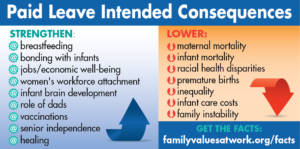When my son was born earlier this year, I was fortunate to have six weeks of paid parental leave made available to me by my employer. And, once that time was exhausted, I was able to take an additional six weeks of paid leave using my accrued sick time. The twelve weeks I spent at home with my son allowed us to adjust to life with one another outside the womb, focusing on our health and wellbeing. This critical time period is known to some as the 4th trimester.
Unfortunately, however, paid parental leave is not a reality for many workers in our nation. In a webinar sponsored by the Institute for Women’s Policy Research, I learned that the U.S. is the only developed nation in the world that does not guarantee some sort of paid leave for parents around the birth of a child. Currently, the only national policy we have in place is the Family Medical Leave Act (FMLA), passed in 1993, which allows employees to take up to 12 weeks of unpaid, job protected leave over a 12-month period, provided certain conditions are met. A 2012 study on the FMLA(PDF) found that only 59% of American workers qualify for the protections provided by the act.
Paid parental leave is not just a nice idea for new parents, it is a public health issue. Numerous research studies have demonstrated the impact that paid parental leave could have on both maternal health and children’s wellbeing. The “Intended Consequences” of paid parental leave are many, as outlined in the infographic below.
Notably, when paid parental leave is made available, new moms are more likely to:
- Make and keep their postpartum appointments and receive preventative care, which is especially important for those who are managing chronic health conditions.
- Make and keep well child visits for their infants, providing their children with preventative care and immunizations that impact their long-term health.
- Breastfeed longer, a practice associated with an abundance of benefits to both mother and child.
- For mothers, breastfeeding is associated with a reduced risk of postpartum depression (PPD). Currently, PPD is the #1 complication of pregnancy, affecting one in seven moms – almost twice as many women who are affected by breast cancer each year. Preventing PPD can lead to improved maternal-infant interactions, which contribute to baby’s emotional and cognitive development.
- For children, breastfeeding is associated with reduced rates of infant mortality, SIDS, asthma, diabetes, certain types of cancer, coeliac disease and more.
- Be physically present with their children during critical periods of growth and development. This is especially true for parents of preemies, as parents with limited paid leave often delay the use of their leave until their babies are released from the hospital. With paid leave as an option, parents could spend time engaging with their children while they are in the NICU. This early engagement can improve infant health and development, reduce pain response among infants, decrease infant stress, and result in shorter hospital stays.
Clearly, the evidence outlined here suggests that it’s high time our nation catch up with the rest of the world and enact a work-family policy that provides parents with paid leave. For the health of mothers, children and our economy, the benefits of such a policy are obvious and significant. Let’s start advocating for ourselves and our future today.


